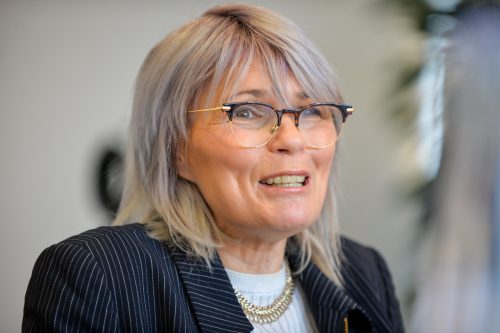Yorkshire can be ‘one of the truly great manufacturing regions in the world’

Manufacturers who spoke passionately about their sector and ensuring its future success at TheBusinessDesk.com’s What Yorkshire Is Made Of roundtable agreed that “in Yorkshire we can be one of the truly great manufacturing regions in the world.”
Gordon Macrae, special projects manager at Sheffield-headquartered Gripple, said that the region could stand out on a worldwide platform if manufacturers concentrated on collaboration, closing supply chains to make them as local as possible and invested in innovation.
Tracey Dawson, managing director of Leeds-based Daletech and also chair of the Leeds Manufacturing Alliance, was very much in agreement with his thoughts. She said it was about having “a passion for manufacturing” and added “I love what our region does.”
Sponsored by Grant Thornton and Progeny Corporate Law, the roundtable discussion covered a variety of topics affecting manufacturers right now. Brexit was a large part of the discussion as the leaders and owners of the firms – including William Cook, Daletech, Portakabin, Wensleydale Creamery, Dual Seal Glass and Gripple – mused over how to prepare for changes in documentation, import and export issues, supply chain concerns and the implementation of tariffs.
But the overall consensus of the room was summed up by David Hartley, managing director of Wensleydale Creamery, who said: ” Whatever Brexit brings, we have to be positive or we may as well pack up – which we are not going to do.”
For exporters in the Yorkshire marketplace, things could be seen in a positive way. Chris Seymour, managing director of William Cook, said: “The one benefit from all of this uncertainty – and will give us a lot more benefit – is the foreign exchange benefit. We are suddenly a lot cheaper.”
However, those importing were anxious about rising costs and supply chains. Hartley of Wensleydale Creamery stating that he could be hit very hard – especially in the event of a no deal Brexit.
Adam Jackson of Grant Thornton agreed that the food industry could more impacted by a no deal Brexit than any other. He told the manufacturers that the EU tariffs will apply to UK goods going into the EU if there is no deal. He said: “The UK government said they will set UK tariffs but the assumption is that the UK will adopt the EU tariffs from day one on a no deal Brexit. Expect the same tariff for products from the EU coming into the UK to be applied. That will be the external tariff that the EU applies to any third country
“Over time, the UK has the choice as to whether they set new tariffs. If you are negotiating with third countries in trade agreements, you are not going to give away your negotiating hand in advance before you have negotiated. On products which the UK doesn’t produce, you can expect tariffs to be very quickly cut,” explained Jackson.
Nigel Meredith, Huddesrfield-based Dual Seal Glass MD, set up the business with his father 24 years ago, said he had suffered the worst trading in its financial history in the recent year.
However, he and his firm are very upbeat about the coming 12 months because the order book is 30% busier than it ever has been. The firm has invested heavily in automation but needs to have a good 20% of the operation still manual, added Meredith.
Mark Overfield of Grant Thornton added that there was a perception about innovation being a large investment for manufacturing firms but actually it was “about doing things better, more efficiently and to a higher quality.”
Talking about growth, Alistair Scott-Somers, of Progeny Corporate Law, said he would advise firms to look at the price expectation for sale and work back from that to plan a growth strategy – working in current revenue, perhaps initiating a ‘buy and build’ and planning on how to improve margins.
He added: “That’s sometimes a good way of dealing it, working out whether the focus needs to be on growth or business improvement. A lot of it is about getting a business ready for sale and the best model for a prospective buyer. Think ‘what do they need to see’?”
This week’s coverage was kicked off with s story about Yorkshire unity and strength. Topics then moved on to growth and Brexit; while the skills gap and innovation formed part of the debate in terms of how the younger generations are attracted to the industry.
A a viewpoint piece from Adam Jackson and Mark Overfield of Grant Thornton looked at how manufacturers can prepare for Brexit; while Alistair Scott- Somers of Progeny Corporate Law urged people to talk about Brexit.









